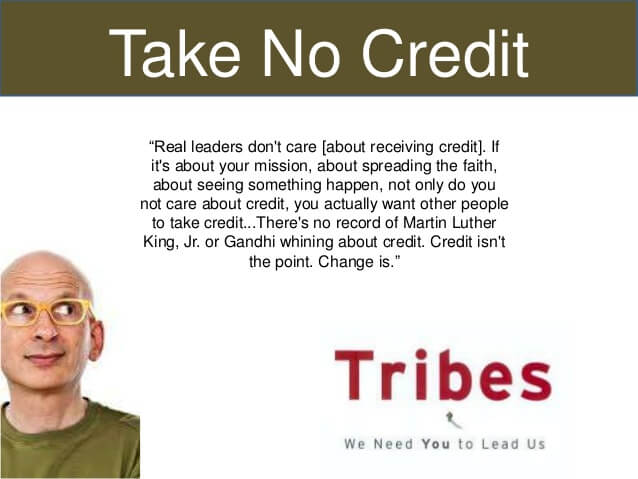Take no credit: Real leaders don’t care about receiving credit.

Here is a lesson we all need to learn a little more. Yes, definitely me.
Over a year ago I reworked this website, right now I’m doing it again. As with last year, I am again seeking professional outside perspective to bring forward what I want to say.
One key reason for this is that I have an internal struggle with the idea of taking credit, in my case simply saying I am expert at something is a struggle (and don’t get me started on people who self-title themselves as “gurus”!).
So, as a leader, don’t take the credit for results, focus on the change you are seeking to lead, then give credit to those who take the action arising.
Today’s post was actually inspired by yesterday’s email from the Daily Stoic, one of the small number of daily emails I am subscribed to (and Seth is another, naturally!), and stoicism is a practice and area of learning for me, as I wrote about recently in: “Be a generalist…and a stoic“.
Today, then, I reproduce that Daily Stoic email, with a powerful and ancient lesson, called, “You Don’t Need Credit”.
You Don’t Need Credit (from Daily Stoic)
Perhaps you remember reading The Odyssey in high school or college (or possibly you picked up Emily Wilson’s fabulous new translation). Even if you haven’t, you’re probably familiar with the cyclops scene. Odysseus and his men find themselves trapped in a cave with Polyphemus, the deranged, man-eating, sheep herding, one-eyed beast. Odysseus hatches an ingenious escape plan: they wait for the cyclops to fall asleep and then stab him in the eye with a sharpened log. Enraged and blinded, Polyphemus staggers to remove the stone he had rolled in front of the entrance of the cave, which frees Odysseus and his men.
It’s brilliant and, best of all, Odysseus, never having given the cyclops his real name, is off scot-free. But then, just out of reach of the bleeding, angry, shouting cyclops, he turns back and taunts:
“Cyclops! If any mortal asks you how
Your eye was mutilated and made blind,
Say that Odysseus, the city-saker,
Laertes’ son, who lives in Ithaca,
Destroyed your sight.”
Odysseus just couldn’t help himself. He wanted the credit. And he stupidly forgot that Polyphemus’ father was Poseidon, and that the lord of the sea was unlikely to act kindly towards someone who had blinded his son. This moment of hubris cost Odysseus something like ten years of his life, as Poseidon threw up countless obstacles, one after the other, between Odysseus and his wife, Penelope, back home in Ithaca. It’s a lesson that many people have heeded (and plenty of others have painfully forgotten) ever since.
Marcus Aurelius, for his part, talked often about the worthlessness of credit. So you did a good thing, he says, why do you need to be thanked for it? It felt good to do, it helped someone else, why do you need the third thing of credit or recognition or gratitude? The same goes for a clever plan or successful business deal. Do you really need people to know you pulled it off?
The answer is that you don’t. In fact, it’s usually better not to get credit (because the ‘right thing’ is not always appreciated, because other people might get jealous, because it puffs up your ego). Think about that today, and remember it always. You don’t need credit. That’s not what should motivate you.
Do the right thing because it’s right. Pursue excellence because that’s what you do. Leave the recognition and the rewards alone
